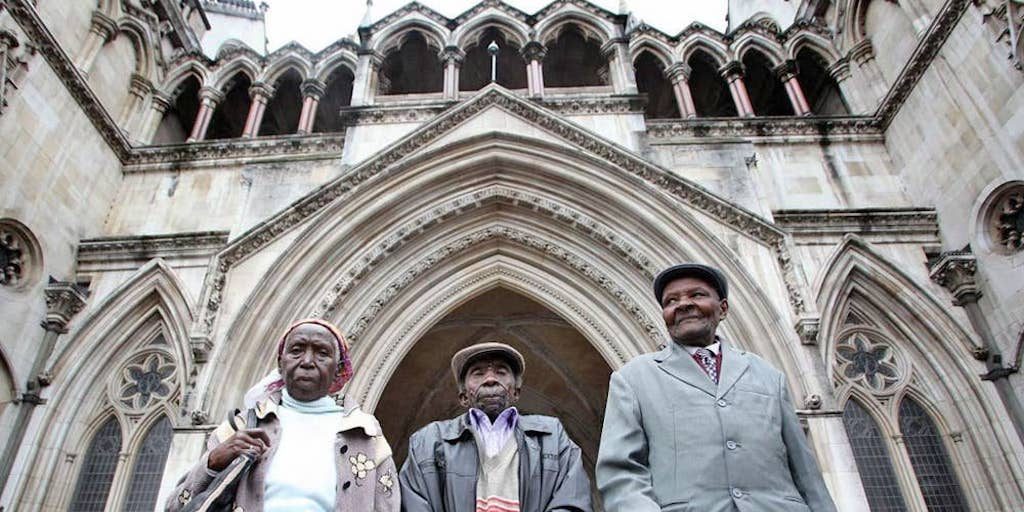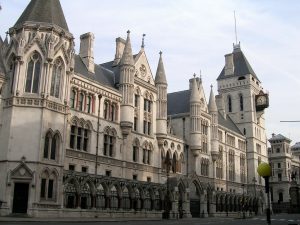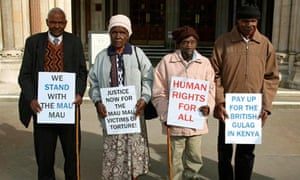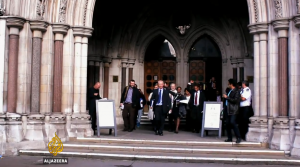The Mau Mau Case: Post-Colonial Justice on the Strand
Posted in 2010-2019, 21st Century, contemporary, Events, future, people, Strandlines, wartime and tagged with government, Layers of London, Legal London, London, Mau Mau, strand, trial, Westminster

“This is a historic judgement today, which will have repercussions for years to come” – Leigh Day Prosecution team.
The Mau Mau insurgency, also known in Britain as the ‘Emergency Period’, was an eight year span of violence in colonial Kenya (1952-60). In 2012, the British High Court of Justice, inside the Royal Courts of Justice, was the site of a historic turning point in post-colonial Britain.

Royal Courts of Justice – on the Strand, in the city of Westminster
Four claimants, who had spent three years in the British court system, were granted full trial. They were suing the Foreign and Commonwealth Office (FCO) as a direct descendant of the colonial office.
As Naomi Nziula, one of these four claimants, stated: “I came here to find out what happened to my children and to seek compensation for my torture and that of my husband”.
What was the Mau Mau insurgency?
To put it simply, the Mau Mau were a fundamentally anti-colonial, pro-independence group that fought British imperial occupation of Kenya. An article written by David Anderson puts forward a graphic description of the horrors committed by the British on all four of claimants. I will briefly cover the testimony of one of the victims to highlight the necessity of this court case, however, further gruesome details will be left out (see the 2016 Guardian long read for more).
Mutua, one of the victims, had been a herdsman on a white farm owned by a man called Dunman. The labourers on this farm were supporting Mau Mau fighters by providing food, which led to Dunman interrogating them all. Mutua was beaten, taken to a prison, and forced to labour while detained. On his second day, he was tortured. Two nights later, the Mau Mau fighters attacked the Lukenya prison camp where he was being held and he went free. Mutua never even lifted a weapon and this is how he was treated.
It is also important to note that per British government statistics, only 32 British people died as opposed to 11,000 Kenyans during the 8 years. Even this figure has been disputed for being artificially lowered by the British government by historian Caroline Elkins. Lowered or not, these numbers clearly show that the Kenyans were savagely attacked throughout this period, and that this court case needed to be heard.
Mau Mau victims get a full trial:

Victims of colonial violence in London
Anderson explains how, in 2011 – after two years of legal proceedings – the High Court in London “found that the British government had a case to answer concerning abuse and torture allegedly carried out by British officials in Kenya”. Justice McCombe, after pouring over the evidence, claimed that there was ample to suport the claim of systematic torture.
Then, there was a breakthrough that helped push this court case towards success: the ‘Hanslope Disclosure’.
A 1967 minute claimed that 1,500 files had been airlifted from Kenya on the eve of independence. These files were nowhere to be found from 2009-2011, during the incipient phases of the court case, in which they would have been invaluable in securing a full trial. Suddenly, when there was a threat by a member of the prosecution that they would inspect FCO facilities to find the 1,500 missing files, they were ‘discovered’. 1,500 files on Kenya, among some 8,800 files! 13 top secret boxes of files on Kenya have never been discovered.
Anderson claims that about 500 files were directly related to the Mau Mau insurgency. He goes on to say that “this saga was both a colonial conspiracy and a bureaucratic bungle”. Hugh Bennett shows that Kenyans had attempted to get the files back in 1967, 1974, and the early 1980s. That does raise the dark question whether this really was a bungle or a cover-up…
These archives showed direct lines of culpability from the Secretary of War in London to the commander-in-chief in Kenya, down to the bottom rungs of the army. Bennett points to a letter dated from December 1953 in which General Erskine, commander-in-chief, admitted to brutality from the parts of his soldiers upon detainees, to the Secretary of War!
So in October 2012, a full trial followed on the back of these allegations backed with archival evidence.
What happened?

Still from Jemma Gander, Kenya’s Mau Mau: The Last Battle, via Al Jazeera.
In mid 2013, the government agreed to “pay £19.9 million in compensation to over 5,000 claimants who had suffered abuse during the Mau Mau Rebellion”. In some senses, this was a great victory for the victims and for justice! Britain had finally admitted to imperial wrong-doing and was now mandated to right these wrongs.
On the other hand, while “the British government recognises that Kenyans were subject to torture and other forms of ill-treatment”, then-Foreign Secretary William Hague explained that it did not believe “that this settlement establishes a precedent”.
While Hague’s denying of a precedent seems like it would not hold up in court, a second case concerning Mau Mau victims was dismissed in 2018 because of the “half century delay” in bringing the case forward. This obviously conveniently forgets to account for decades of deliberately hidden or accidentally misplaced evidence by British government. Despite the flaws of this ruling, I suspect it might be the first of many such disappointments.
What does the future hold?
Anderson put it aptly in his article: the Mau Mau ruling put “the entire reputation of British empire itself on trial” and everyone found out Britain was guilty of indescribable horrors. The future will certainly see more case against the British establishment as there are files on 37 previous colonies and only 1,500 out of 8,800 are on Kenya.
Unfortunately, there are limitations, claimants are all going to be very late in their lives and the British government knows this very well. They will fight court cases through attrition, as they did the Mau Mau case. George Morara, Kenyan Human Rights Commission, pointed out that the British weren’t denying the eligibility of their case, only trying to displace responsibility onto Kenyan state, to delay the court case. Between the British denying claims due to delays, the aging population of claimants, and only-recently released Hanslope files, there may not be any future successful cases.
Finishing thoughts
This is a terrible shame for Brits everywhere. Britain will never move forward if we keep denying wrongdoing in the imperial period. Resistance from Europeans can be spotted in many of the articles that I’ve linked in this blog post. For example, some critics accused that Elkins was biased towards the claimants rather than just researching the truth.
Western violence in the global south over centuries is not something one can dismiss through legal technicalities. William Hague said that Britain recognises the plight of the Mau Mau victims in 2013. It is time Britain owned up to its mistakes without need for victims to go through a trial. Nothing but one hundred percent clarity will allow Britain to move forward, and truly enter a post-colonial period.
This has been written using information put forward by three historians who testified for the court case: David Anderson, Huw Bennett, and Caroline Elkins. This was also supported by information provided through an Al Jazeera documentary by Jemma Gander called: Kenya’s Mau Mau: The Last Battle”.

Says it all that there are no comments